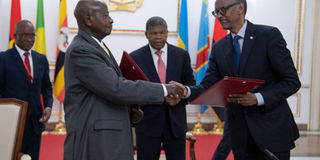Uganda, Rwanda to repatriate fugitives

Uganda's President Yoweri Museveni (left) shakes hand with his Rwandan counterpart Paul Kagame after signing an agreement to end the hostility between the two countries in Luanda, Angola, on August 21, 2019. PHOTO BY URUGWIRO
Uganda and Rwanda have agreed to fast-track a treaty on extradition to provide a “framework for future exchange of criminal fugitives” as part of a deal to resolve the months-long tensions between the two countries.
The treaty on extradition was among the six points agreed upon at yesterday’s meeting of the ad hoc commission for implementation of the memorandum of understanding ( MoU) signed last month between Presidents Museveni and Rwanda’s Paul Kagame in the Angolan capital, Luanda.
Rwanda has long accused Uganda of supporting its dissidents while Uganda accuses Rwandan operatives of espionage. Rwanda has accused Uganda of arresting its citizens but Uganda also says those arrested have committed crimes.
Previously, Rwandans citizens wanted by Kigali were abducted and repatriated without formal procedures, sparking outrage from Kampala and protestations by the international community.
Other key points, according to a communiqué signed off by Foreign Affairs minister Sam Kutesa and Rwanda’s minister of State for Foreign Affairs Olivier Nduhungirehe, include due process being followed in dealing with each other’s citizens, and refraining from any acts of destabilisation against each other.
Mr Kutesa was accompanied to the meeting by, among others Internal Affairs minister Gen Jeje Odongo, Attorney General William Byaruhanga, Foreign Affairs Permanent Secretary Patrick Mugoya, and the External Security Organisation boss Julius Ocwet.
The ad hoc commission was agreed upon in the August 26 MoU signed by President Museveni and President Kagame, and witnessed by the Angolan President Joao Lourenco and the Republic of Congo President Denis Sassou Nguesso, following the earlier quadripartite summit convened in July.
Uganda and Rwanda have had frosty relations and they hit lowest on February 28 when Rwanda closed its borders with Uganda in Katuna and Chyanika in Kabale and Kisoro districts, respectively.
On June 10 Kigali temporarily opened its Gatuna border for two weeks and closed it again.
Kigali accuses Kampala of among others supporting rebel groups to destabilise Rwanda, which claims Uganda denies. Besides advising its residents against travelling to Uganda, Kigali has also made several demands such as Uganda throwing out businessmen it claims are supporting dissidents.
Security issue
Rwanda, according to the communiqué, also provided a list of its nationals detained by Ugandan security forces, whom it wants released as soon as possible. Information which Uganda “committed to verify and for purpose of processing those named and releasing those with no evidence of criminal conduct…..”
The two sides also committed to cease all forms of propaganda in mainstream and social media, while the issue of free movement of persons and goods and services across the common border and other outstanding issues will be discussed at the next meeting to be held in 30 days in Kampala.




